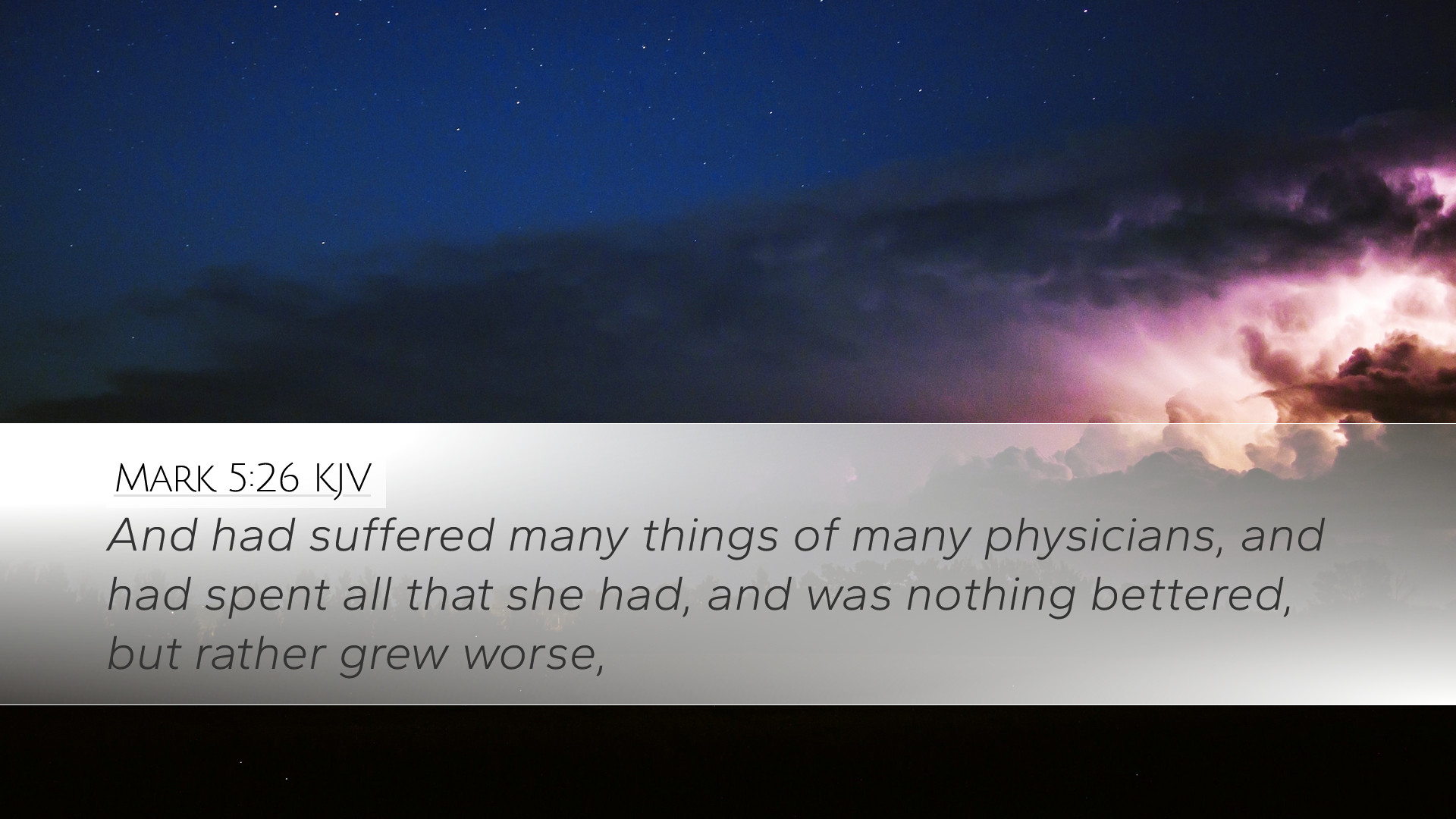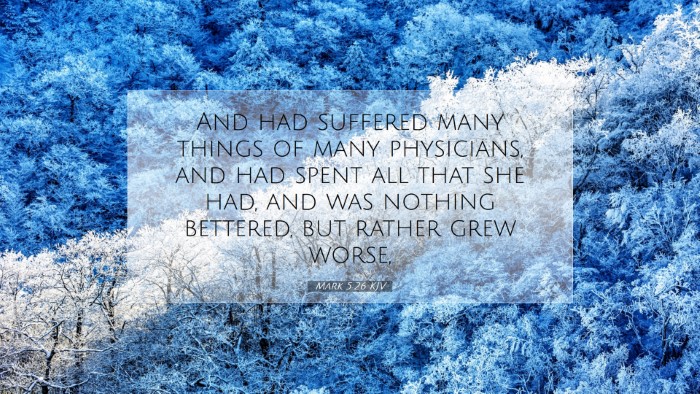Bible Commentary on Mark 5:26
Mark 5:26 (ESV): "And who had suffered much under many physicians, and had spent all that she had, and was no better but rather grew worse."
Introduction
This passage portrays the desperate condition of a woman afflicted with a chronic illness. It provides a vivid illustration of human suffering, the limits of medical intervention, and the power of faith. Commentaries by Matthew Henry, Albert Barnes, and Adam Clarke put forth various insights that guide us to deeper understanding.
Understanding the Context
Contextual background: The account occurs within the narrative of Jesus' ministry. This woman, referred to as the woman with the issue of blood, is part of the broader story of Jairus, a synagogue leader whose daughter is critically ill. The narration intertwines these two stories, illustrating the intersection of faith and desperation.
- Significance of her condition: The woman's ailment of hemorrhaging was not just a physical affliction but also had social and spiritual implications, rendering her unclean according to Jewish law (Leviticus 15:25-27).
- The desperation of her situation: Having exhausted all her resources and suffering at the hands of many physicians, her plight exemplifies human limitations in addressing profound suffering.
Insights from Matthew Henry
Matthew Henry highlights the spiritual lessons derived from this passage. He notes that the woman’s affliction symbolizes sin and the inevitability of human suffering that cannot be alleviated by human means alone. His reflections include:
- The futility of worldly solutions: Henry emphasizes that despite the many attempts of physicians, the woman was no better but grew worse, illustrating the helplessness of worldly remedies for spiritual crises.
- The journey to faith: He notes that her spending of all her living on physicians mirrored humanity’s futile efforts to find solace outside of Christ.
Insights from Albert Barnes
Albert Barnes offers additional reflections, focusing on the woman's faith and the socio-religious implications of her condition. His commentary includes:
- Desperation leading to divine faith: Barnes points out that her desperate situation drove her to seek Jesus, highlighting that affliction can lead individuals to God when worldly solutions fail.
- The cost of her healing: He notes how her financial burden reflects the high cost of seeking help from the world, which ultimately failed her.
Insights from Adam Clarke
Adam Clarke’s commentary provides a thorough analysis of the woman's suffering and its background in Jewish customs. Key insights include:
- Social isolation: Clarke emphasizes the social ramifications of her condition, stressing that she was shunned due to her ceremonial uncleanness, highlighting the profound loneliness of those suffering from chronic illness.
- Faith as the path to healing: He stresses that her healing came not from the physicians but through her faith in Jesus, demonstrating a critical theological point about the nature of true healing.
Theological Reflections
The narratives converging in Mark 5 present several theological themes:
- The theme of desperation and divine intervention: The woman's despair points to the broader human condition and the need for divine assistance. It illustrates Christ as the ultimate healer.
- The affirmation of faith: The passage underscores that faith in Christ is foundational to receiving healing and restoration, reinforcing salvation’s call to all who suffer.
- Hope amid suffering: It serves as encouragement that no matter how dire the circumstances, turning to Jesus in faith can result in wholeness—a critical lesson for pastors and students of scripture.
Practical Applications
This passage does not simply relate a historical event but serves as an enduring message for today. Its implications invite reflection on:
- Encouraging the afflicted: Pastors and church leaders are reminded to minister with compassion, recognizing the deep wounds that chronic illnesses cause, both physically and emotionally.
- Faith in the face of adversity: This text teaches that in the midst of personal trials, turning to Jesus should be our first response rather than a last resort.
- The critical evaluation of worldly solutions: It challenges believers to assess where they place their trust—whether in worldly solutions or in the divine healer.
Conclusion
Mark 5:26, within its context, serves as a powerful testament of faith amid suffering and illustrates the eventual triumph of Christ over our afflictions. Through the lens of the commentaries reviewed, it is apparent that this woman’s plight and subsequent encounter with Jesus provide profound lessons on faith, healing, and the importance of seeking divine over human intervention.


